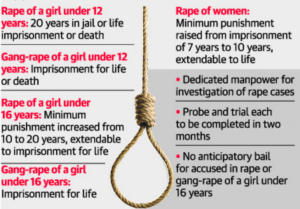CRIMINAL LAW AMENDMENT ACT 2018: A CRITIQUE OF IPC AND CrPC PROVISIONS
CRIMINAL LAW (AMENDMENT) ACT 2018: A CRITIQUE OF IPC AND CrPC PROVISIONS
The Criminal Law (Amendment) Bill, 2018 was passed to replace the Criminal Law (Amendment) Ordinance, 2018 which was promulgated after the Kathua and Unnao rape incidents. The bill covers the same amendments as were in the ordinance. The Ordinance was criticized as “red-herring”. The flaw was that the conviction rate in rape cases is already low. This law only enhances the punishment but did not confirm the conviction rate as directly proportional to number of rape cases. But unfortunately, without making much desired changes the bill was assented as an Act. The Criminal Law (Amendment) Act, 2018[1] (CLAA) provides amendments in The Indian Penal Code, 1860 (IPC),[2] The Criminal Procedure Code, 1973 (CrPC),[3] The Evidence Act, 1872 (IEA)[4] and The Protection of Children from Sexual Offences Act (POCSO).[5]

AMENDMENTS IN IPC BY CLAA, 2018
The Criminal Law (Amendment) Act, 2018 amended IPC in two ways; firstly, made amendments to existing sections. Secondly, inserted new provisions of law. These amendments aim to create deterrence effect against the increasing sexual violence against minors. But the law lacks in reconciling itself with the ground realities of gender related sexual violence in India.
-
Blurred classification of ‘rape’
On Section 375, 376 IPC at glance, before 2018 amendment, one identifies the punishment for rape simpliciter under Clause 1 and punishment for aggravated forms of rape under clause 2 of Section 376. The former class of rape provides for the general offence of rape and prescribes lesser punishment which may extend to 7 years. Whereas, the latter provision under clause 2 of section 376, provides for 14 circumstances where the nature of rape is considered aggravated[6] and thus, provides higher punishment which shall not be less than 10 years but which may extend to life imprisonment. But the Criminal Law (Amendment) Act, 2018 enhanced the minimum punishment for rape from 7 years to 10 years.[7]
This makes the punishment same for both the offence of rape and its aggravated forms and there is no rational reasoning as to why grave forms of rape are also awarded with same punishment. When IPC itself classifies offence on basis of aggravated nature, then the punishment shall also be in proportion to such classification. This law has wide and serious ramifications.[8]
New provision regarding rape of women under 16 years of age has been inserted as sub sec (3)[9] and earlier provision regarding this under section 376 (2) (i)[10] has been deleted. The new provision provides a minimum punishment of 20 years which may extend to life imprisonment. This minimum sentence of 20 years seems unreasonable and grave in absence of judicial discretion which though existed pre 2013.[11] Before 2013 amendment, wide discretion was available with the judges, so ‘mandatory minimum sentence’ was introduced in 2013 to reduce the practice of judicial discretion in rape cases. The case becomes more serious if the accused too is minor, because Juvenile Justice Act (Care and Protection of Children), 2015 provides that a juvenile may be tried as an adult[12] and may be punished under IPC. A juvenile may be awarded a minimum sentence of 20 years imprisonment in such cases of conflict of law, 20 years is not a short duration so the object of reforming offenders may get defeated.
New Provisions of Rape and Gang Rape of Minor:
The Criminal Law (Amendment) Act, 2018 has created three new offences of rape by inserting Sections 376AB, 376DA, 376DB in the IPC. Section 376AB provides punishment for rape of woman under 12 years of age. The minimum punishment shall be 20 years which may extend to life imprisonment (which means the remainder of that person’s natural life) and maximum sentence is death penalty.
Sections 37DA[13] and 376DB[14] are considered as extension to Gang Rape under Section 376D. As the punishment in these cases is mandatory, it may have negative consequences on conviction rates because due to mandatory nature, the Judges may require higher standard of proof.[15] But these stringent punishments can often lead to drop down of child marriages. On the other hand, there is a possibility that minor wives may not file rape cases against their husband due to harsh punishments like capital sentence.
The Gang Rape provisions are gender neutral in regard to perpetrator; both men and women are liable for committing a gang rape on minor. The core reality is that women can not commit rape but she can be a part of gang committing rape. The Supreme Court in Priya Patel v. State of Maharashtra,[16] interpreted the term, “in furtherance of their common intention” and said that it inflicts the intention to commit offence of rape and its unthinkable that a woman could rape another woman. This narrow interpretation ignores the joint liability rule. The joint liability rule was supported by J. Verma Committee report[17] which provided that each perpetrator shall be liable despite of gender. But this was not incorporated by 2013 Criminal Law Amendment. This space is not filled by 2018 Amendment Act even.
Death Sentence for Offence of Rape: Really a Necessity?
Prior to Criminal Law Amendment Act, 2018, death sentence was awarded in only 2 aggravated forms of rape i.e. when vegetative state was caused or murder was committed during the course of rape and secondly, in case of rape by habitual offenders. Where the world nations opposed death penalty and abolished it, India revived it for new offences. Supreme Court has in any cases limited the scope of death sentence to rarest of rarest cases.[18] The extension of such harsh punishment to rape cases must be thoroughly analyzed. The Malimath Committee report had also rejected the awarding of death penalty in rape cases.[19] There is infact no provision of probation or parole in such cases, and rigorous imprisonment is already provided in aggravated new offences of rape, besides this, life imprisonment is one of the punishment which is nothing less than hard punishment because person has to live in imprisonment for the whole of his life and would not atleast once be released on probation. So, when already such harsh punishment is awarded, 2018 Amendment Act fails to justify the reasonable reason for awarding such punishment, because deterrence is no reason for such punishment. This is evident from the fact that the offences in which death sentence is one of the punishment but still the commission rate of those offences is rising. In many cases the accused is known to the victim or her family member and such cases goes unreported, then what is the use of such punishments when cases are not coming out.

An inherent conflict between POCSO and IPC
Section 42 of POCSO has been amended with the objective of giving over riding effect to IPC over POCSO in regard to punishment as IPC provides higher punishment for rape.[20] The only caveat is that the act or omission must be an offence under both the IPC and POCSO. The Criminal Law (Amendment) Act, 2018 failed to consider the fact that POCSO is ‘gender-neutral’ whereas, IPC is ‘gender specific’ in rape matters. The word ‘person’ is used in POCSO in reference to victim and perpetrator but under Sections 375, 376 and related provisions of IPC, the words ‘woman’ and ‘man’ are used for victim and perpetrator respectively. If penetrative sexual assault is committed against any girl below 12 years of age, the accused would be punished with sentence of life imprisonment or death sentence as maximum punishment, by virtue of Section 376AB read with Section 42 of the POCSO if same offence is committed with male child of same age group, then POCSO provides punishment not less than 10 years but which may extend to life imprisonment and no provision regarding the same is provided in IPC. This roots inequality between the gender groups and its huge discrimination because maximum punishment in case of minor male is equal to minimum punishment being awarded in case of minor female child. To this extent the 2018 Act is violative of Article 14 of the Constitution.
Enhancing punishment does not solve the problem. Criminal Justice system is in shambles and if nothing is thought for streamlining the Criminal Justice, then this law is again going to remain a ‘paper tiger’. Justice is moving at puller cart pace and if it continues, crime would neither be prevented nor reduced. Besides this, the provision under Section 114A of the Indian Evidence Act has been extended to cases of rape where the victim is under 12 or 16 years of age.
CRIMINAL PROCEDURE CODE: AMENDMENTS BY CLAA, 2018
The Criminal Law (Amendment) Act, 2018, provided that delay in investigation shall pave a way for tampering of evidence, witness intimidation and the acquittal would be the consequence. His enactment has reduced the period of investigation from 3 to 2 months.
It provides for the disposal of appeals within 6 months. But the Act is silent about the consequences, if investigation is delayed or appeals are not disposed within 6 months. If the prior process is not completed within time and in consonance with criminal justice principle then there is no need of enhancing the punishment as such situations will result into acquittal.
POSITION OF VICTIMS:
-
Instead of bringing amendments in IPC, these should have been brought under POCSO because provisions regarding children must be provided under one law so as to remove any confusion. When the person wants to prosecute or file a complaint or defend then he has to see two laws which must not be that complex.[21]
-
Section 10 of the IPC defines women as the female of any age but in reality we consider the female as woman who is an adult. It would bring more sensitivity and consciousness in saying a child has been raped instead of referring rape of 2 year child as woman has been raped. This required substitution of definition of ‘women’ under section 10 of IPC.
-
Victims are still prey of insensate offenders though there are number of provisions under POCSO for the protection of child victims. Now, again enhancing punishment will not serve the objective of stopping this brutality.[22]
CONCLUSION AND SUGGESTIONS
The Criminal law should be devoid of all inconsistencies and ambiguities. Ambiguities create confusion in understanding law. The recent anti-rape law tried to remove all such ambiguities in case of rape and brought many amendments in IPC, CrPC.
Some good changes have been brought like limiting period of the investigation which is the sensitive part of the issue involved is a good step towards ensuring justice. But many parts of law that need to be highlighted and taken into account are still not put life into and are buried beneath the earth. There should be effective Witness Protection programme, which is responsible for streamlining justice. Every police station must be provided with forensic vans which will accompany police to the crime scene for the collection of forensic evidence before it’s destroyed or it gets destroyed. Its collective shame to have same punishment for the offence of murder and aggravated form of rape, though rape is much heinous than murder because the victim being alive dies every moment but to stop such heinous crime enhancement of punishment is no solution, especially in a nation where there is a little conviction rate in rape cases.
[1] The Criminal Law (Amendment) Act, 2018 (22of 2018).
[2] Indian Penal Code, 1860 (Act 45 of 1860).
[3] The Criminal Procedure Code, 1973 (Act 2 of 1974).
[4] The Indian Evidence Act, 1872 (Act 1 of 1872).
[5] The Protection of Children from Sexual Offences Act, 2012 (Act 32 0f 2012).
[6] See, supra note 2 at s. 376(2) clause (a) to (n).
[7] Supra note 1, s. 4:
In Section 376 of the IPC-
In sub-section (1), for the words “shall not be less than 7 years, but which may extend to imprisonment for life, and shall also be liable to fine”, the words “shall not be less than 10 years, but which may extend to imprisonment for life, and shall also be liable to fine” shall be substituted.
[8] Abhishek Gupta, Decoding ‘Deterrence’: A Critique of the Criminal Law (Amendment) Act, 2018, ILI Law Review, 2018.
[9] Supra note 2, s. 376:
Whoever, commits rape on a woman under 16 years of shall be punished with rigorous imprisonment for a term which shall not be less than twenty years, but which may extend to imprisonment for life, which shall mean imprisonment for the remainder of that person’s natural life, and shall also be liable to fine.
[10] ibid., s. 376(2) (i): commit rape on woman when she is under 16 years of age.
[11] Mrinal Satish, Discretion, Discrimination and the Rule of Law: Reforming Rape Sentencing in India, Cambridge University Press, 2016.
[12]Under JJ Act, a child (16-18years) may be tried as an adult for heinous offence if the Juvenile Justice Board (u/s 15, 18) and the Children’s Court (u/s 19) decides that there is a need for trial of the child according to provisions of CrPC.
[13] Supra note 1 at s.6 which corresponds to IPC, s. 376DA:
Where a woman under 6 years of age is raped by one or more persons constituting a group or acting in furtherance of a common intention, each of those persons shall be deemed to have committed the offence of rape and shall be punished with imprisonment for life, which shall men imprisonment for the remainder of that person’s natural life, and with fine.
[14] ibid. s.6 which corresponds to IPC, s. 376DB:
Where a woman under 2 years of age is raped by one or more persons constituting a group or acting in furtherance of a common intention, each of those persons shall be deemed to have committed the offence of rape and shall mean imprisonment for the remainder of that person’s natural life, and with fine or with death.
[15] Supra note 8 at p. 143.
[16] Priya Patel v. State of Maharashtra (2006) 6 SCC 263.
[17] Justice J.S. Verma, Justice Leila Seth et.al. Report of the Committee on Amendments to Criminal Law (2013).
[18] See, Bachan Singh v. State of Punjab(1980) 2 SCC 684, Machhi Singh v. State of Punjab (1983) 3 SCC 470, Sangeet Singh v. State of Haryana (2013) 2 SCC 452.
[19] Government of India, Ministry of Home Affairs, Committee on Reforms of Criminal Justice System (March 2003) p.193.
[20] Supra note 5 at s. 42.
[21] Supra note 15.
[22] ibid.


Congrats to the vry talented girl of our class….proud of u jaspreet ..u nailed it…keep it up👍
you’re really a excellent webmaster. The web site loading velocity is incredible. It seems that you are doing any distinctive trick. Furthermore, The contents are masterpiece. you have performed a fantastic activity in this subject!
Hi to all, how is everything, I think every one is getting more from this web site, and
your views are good designed for new people.